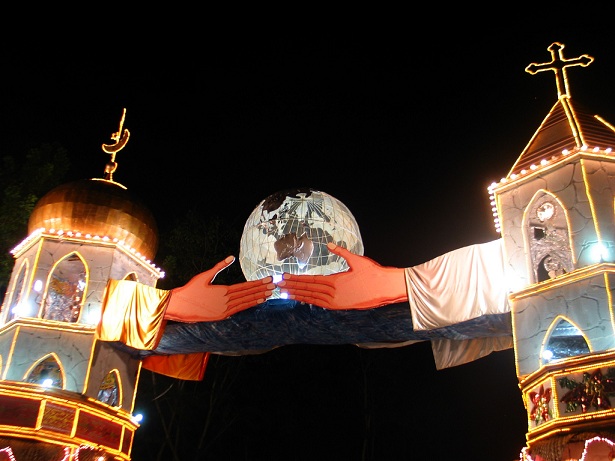It is commonly said that Nigeria’s political culture needs redemptive agents to stop its nosedive to senility and spiteful polarisation. Since religion runs deep in our national psyche, people expect religious leaders to play messianic roles of enlightenment, empowerment and emancipation. Some are indeed now active in the political sphere. However, we seem to lack ecclesiastical statesmen whose methods of engagement do not politicise religion, or colourise politics with religious sentiments.
What prevails is a forced unholy matrimony. In which, politics presents itself mostly as chain and blindfold to religion. While religion offers itself to politics as a beggar pleased to feast on crumbs in exchange for its soul.
Recently, a leading national newspaper reported that “Obi campaigns for Catholic governor.” According to the report, the Anambra State, Commissioner of Works, Mr Callistus IIozuwa, speaking on behalf of the Governor at the inauguration of Widows and Less Privileged Members Foundation at the Holy Trinity Basilica, Onitsha, enjoined Catholics not to relinquish their control of political power in the state. He disclosed that the late Catholic Archbishop of Onitsha, the Most Rev. Albert Obiefuna’s counsel on the imperative of alternative political platforms, was instrumental in the formation of APGA; noting that explains why past and present leaders of the party are Catholics.
Earlier, Apostle Peter Waga Nnopu made headlines, predicting the Victory of Ngige in the polls. He said, “I predicted that Governor Peter Obi was going to win the 2010 election…Now the same God has revealed to me that Ngige is going to win…I am not happy the way Governor Obi is trying to make it look as if Anambra State is all about Catholic Church, the way he is politicising religion in Anambra because of election, is not in the interest of the state.”
These statements demonstrate our ingrained proclivities to harness religious capital for political gains. Agreed, politics is not a self-perpetuating art and practice. It requires cultural, ideological and economic props to thrive. Analogically, in a stand-alone context, it is like a bird without wings; a ship without rudder. But, religion should not be hijacked for politics. It could trigger provincial partisanship, born-to-rule syndrome and quasi-democratic practices that negate accountability. Mind-controlling propaganda, paternalistic leadership and cult-like allegiance are the defining features of politics fussed with religion.
Religion and politics are not Siamese twins. Their prevailing inseparability is a cosmetic construct by greedy hot-gospellers and politicians without pro-poor developmental agenda. Those incapable of eliciting groundswell support for “chop-chop politics” use religion to manipulate people. Seemingly, it’s the hallmark of pragmatism for politicians to seek ecclesiastical endorsements and galvanise mass support by religious means. But it is not when clergymen present them as the “Lord’s anointed.”
The unfortunate death of 30 worshipers at Uke, Anambra State, during an all-night meeting organised by the Holy Ghost Adoration Ministry, under the leadership of the esteemed Rev. Fr Emmanuel Obinna, has elicited questions. Let me pose some. For religious institutions to be effective in service to God and humanity must they become appendages of political parties or turn prayer grounds to campaign grounds? Can clergy-politicians make our political culture nonviolent, issue-based and value-driven? Do political serpents need shepherds?
I agree with Ronald Johnstone: “Inasmuch as both religion and politics are social institutions and consist of subgroups, norms, and people, they interact with one another; they sometimes overlap in their functions; they often involve the same people; they seek commitment and involvement from the same people.” This is a fact secularisation theorists who advocate church-state separation prefer to ignore.
Given the historical roots of church-state separation and its attendant drawbacks, I am not canvassing that the religion should be pushed to the margin. The gruesome experiences of religious minorities, like the Puritans, Quakers and Huguenots in Britain and France in the late 18th century led to church-state separation in the United States. It was designed to safeguard religious minorities from persecution and ensure religious parochialism does not extinguish the flames of liberty.
Secularism and humanism have unabatedly extended the scope of this dichotomy. Many religious thinkers say that this “forced dichotomy” is dysfunctional. While secularisation theorists claim it has fuelled the ascendance of democratic ethos and technological revolution; consequently improving human life.
Interestingly, in the West, religion is not dead in their political life. For example, in the United Kingdom, the Queen, is the Supreme Governor of the Church of England. This titular leadership role enables her to perform many ceremonial functions in the church. She appoints archbishops and bishops of the church based on the advice of the Prime Minister, who screens names selected by a Church Commission. These clergymen take oath of allegiance to the Queen and may not voluntarily resign without Royal approval. To buttress the symbolic role of religion in their political culture, the “Lords Spiritual” sit in the House of Lords.
Unfortunately, in our clime, politics demonises religion, because their fusion lacks benign temperament and transformational power. It causes clash of values and identities, and CAN-under-my-feet attitude. Robbing clergymen of their moral authority to speak truth to power and denounce social injustices. Possibly as a result, some clergymen have failed to be conveyors of wisdom for national development and unity. Many are not light and salt in our turbid political landscape. They are to politicians what a lamppost is to the proverbial drunkard: an instrument of support, not of illumination.
For religion to benefit our political culture it must rise above partisanship and lend itself to pan-human progress. Promoting a faith-based leadership election process in detriment of competency, credibility and character retards national development.


